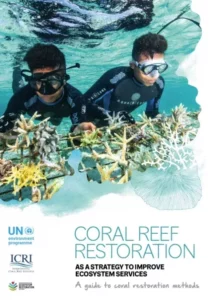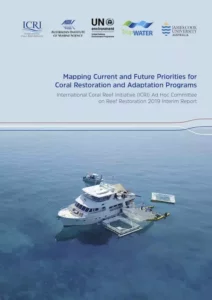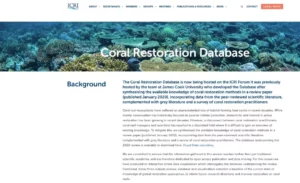Background
The ad hoc committee on reef restoration was established by ICRI at the 33rd ICRI General Meeting, December 2018, in response to disturbances affecting coral reefs, in particular, thermal stress-induced global mass coral bleaching events and the current climate forecasts predicting that sea temperatures will exceed the thermal tolerances of corals.
At the 34th and 35th General meetings (December 2019 and February 2021), ICRI members agreed on extending the mandate of the ICRI ad hoc committee on reef restoration. At the occasion of the 37th General Meeting, ICRI Members agreed to adopt a motion to extend the ad hoc committee under new Terms of Reference.
The updated objectives of the ad hoc committee for 2024 are to:
- Provide a coordinating mechanism for international collaboration on coral reef restoration research and development.
- Advocate for the use of best practice restoration techniques and identify and streamline examples of relevant policy, regulation, and legislation as part of a broader strategy that involves traditional management, mitigation policy and reducing carbon emissions in order to maintain coral reef function, structure and resilience.
- In close collaboration with the Coral Restoration Consortium, facilitate the transfer of new knowledge of restoration techniques to managers and restoration practitioners.
- Maintain the Restoration Hub on the ICRI website.
- Support the UN Decade of Ocean Science and the UN Decade on Ecosystem Restoration, and the Global Biodiversity Framework to help prevent, halt and reverse the degradation of coral reef ecosystems worldwide by promoting knowledge-based restoration, upscaling, monitoring, and capacity building.
ICRI resolutions relating to the ad hoc committee
- ICRI GM 37 (Hawai’i, 2023) – Resolution to extend the ICRI ad hoc committee for coral reef restoration and adaptation (PDF File)
- ICRI GM 36 (Online, 2021) – Resolution to extend the ICRI ad hoc committee for coral reef restoration and adaptation (PDF File)
- ICRI GM 35 (Online, 2021) – Resolution to extend the ICRI ad hoc Committee on coral reef restoration and adaptation research and development (PDF File)
- ICRI GM 34 (Townsville, Australia, 2019) – Resolution to extend the ICRI ad hoc Committee on coral reef restoration and adaptation research and development (PDF File)
- ICRI GM 33 (Monaco, 2018) – Terms of Reference for the ad hoc committee on reef restoration (PDF File)
Composition
Chair: Rowana Walton (UNEP-WCMC), Tali Vardi (Coral Restoration Consortium)
Membership: Australia, Belize, Commonwealth Blue Charter, Coral Guardian, Coral Restoration Consortium, Coral Triangle Initiative on Coral Reefs, Fisheries, and Food Security (CTI-CFF), Coral Research & Development Accelerator Platform (CORDAP), France, Great Barrier Reef Foundation, International Coral Reef Initiative (ICRI) Secretariat, Indonesia, International Coral Reef Society (ICRS), Japan, Monaco/Centre scientifique de Monaco (CSM), Reef Restoration and Adaptation Program, Reef-World Foundation, Secretariat of the Pacific Regional Environment Programme (SPREP), The Nature Conservancy, United Nations Environment Programme, World Conservation Monitoring Centre (UNEP-WCMC), United States of America.
Working procedures
The ad hoc committee will conduct its work via email, telephone, video conference and, when necessary, internet-based services.
Outputs
 ‘“Coral reef restoration as a strategy to improve ecosystem services: A guide to coral restoration methods’ (Hein et al. 2020) was the first official report for the UN Decade of Ecosystem Restoration. It presents an overview of the best- available knowledge in the field and provides realistic recommendations for the use of restoration as a management strategy for coral reefs to assist managers, practitioners, policy makers, and funding agencies to make informed decisions. Whilst not designed to reduce climate impacts, coral reef restoration can be a useful tool to support resilience, especially at local scales where coral recruitment is limited, and disturbances can be mitigated. Ongoing investment in coral reef restoration research and development globally will improve the scale and cost-efficiency of the methods currently applied.
‘“Coral reef restoration as a strategy to improve ecosystem services: A guide to coral restoration methods’ (Hein et al. 2020) was the first official report for the UN Decade of Ecosystem Restoration. It presents an overview of the best- available knowledge in the field and provides realistic recommendations for the use of restoration as a management strategy for coral reefs to assist managers, practitioners, policy makers, and funding agencies to make informed decisions. Whilst not designed to reduce climate impacts, coral reef restoration can be a useful tool to support resilience, especially at local scales where coral recruitment is limited, and disturbances can be mitigated. Ongoing investment in coral reef restoration research and development globally will improve the scale and cost-efficiency of the methods currently applied.
 ‘Mapping current and future priorities for coral restoration and adaptation programs’ (McLeod et al. 2019) was the main report from the ad hoc committee in 2019. An online survey was distributed to ICRI members and supplemented with expert knowledge. Most ICRI countries were using coral restoration as a tool to manage their reefs. The most commonly used techniques were coral gardening and direct transplantation, followed by artificial structures. The most common objectives were engaging local communities and supporting tourism and fisheries production. ICRI members also highlighted the importance of research into coral adaptation or climate protection. Almost all ICRI country-members stated that new policy relevant to restoration was needed.
‘Mapping current and future priorities for coral restoration and adaptation programs’ (McLeod et al. 2019) was the main report from the ad hoc committee in 2019. An online survey was distributed to ICRI members and supplemented with expert knowledge. Most ICRI countries were using coral restoration as a tool to manage their reefs. The most commonly used techniques were coral gardening and direct transplantation, followed by artificial structures. The most common objectives were engaging local communities and supporting tourism and fisheries production. ICRI members also highlighted the importance of research into coral adaptation or climate protection. Almost all ICRI country-members stated that new policy relevant to restoration was needed.
 The Coral Restoration Database is now being hosted on the ICRI Forum it was previously hosted by the team at James Cook University who developed the Database after synthesising the available knowledge of coral restoration methods in a review paper (published January 2020), incorporating data from the peer-reviewed scientific literature, complemented with grey literature and a survey of coral restoration practitioners.
The Coral Restoration Database is now being hosted on the ICRI Forum it was previously hosted by the team at James Cook University who developed the Database after synthesising the available knowledge of coral restoration methods in a review paper (published January 2020), incorporating data from the peer-reviewed scientific literature, complemented with grey literature and a survey of coral restoration practitioners.
Related documents:
- Report by the Reef Restoration ad hoc Committee to the 35th General Meeting (PDF File)
- Report of the ad hoc committee at the 34th ICRI General Meeting: Mapping Current and Future Priorities for Coral Restoration and Adaptation Programs(PDF File)
- ICRI Restoration and Adaption factsheet (PDF File)
- ICRI Decision on Reef Restoration (adopted during the ICRI Coordination and Planning Committee (CPC) Meeting, 5-6 April 2001, Cebu City (Philippines))
- Resolution to update the 2005 ICRI resolution on artificial coral reef restoration and rehabilitation (PDF File) was adopted.
- Australia completed the first phase of the Reef Restoration and Adaptation Program (RRAP), which evaluated the feasibility of an array of potential interventions and delivery methods to assist the Great Barrier Reef to recover from major disturbances and adapt to a changing climate. The recommendations arising from the RRAP can help coral reefs worldwide. In parallel, the US National Academies of Sciences, Engineering and Medicine (NASEM) conducted a review on ‘Interventions to Increase the Resilience of Coral Reefs’.